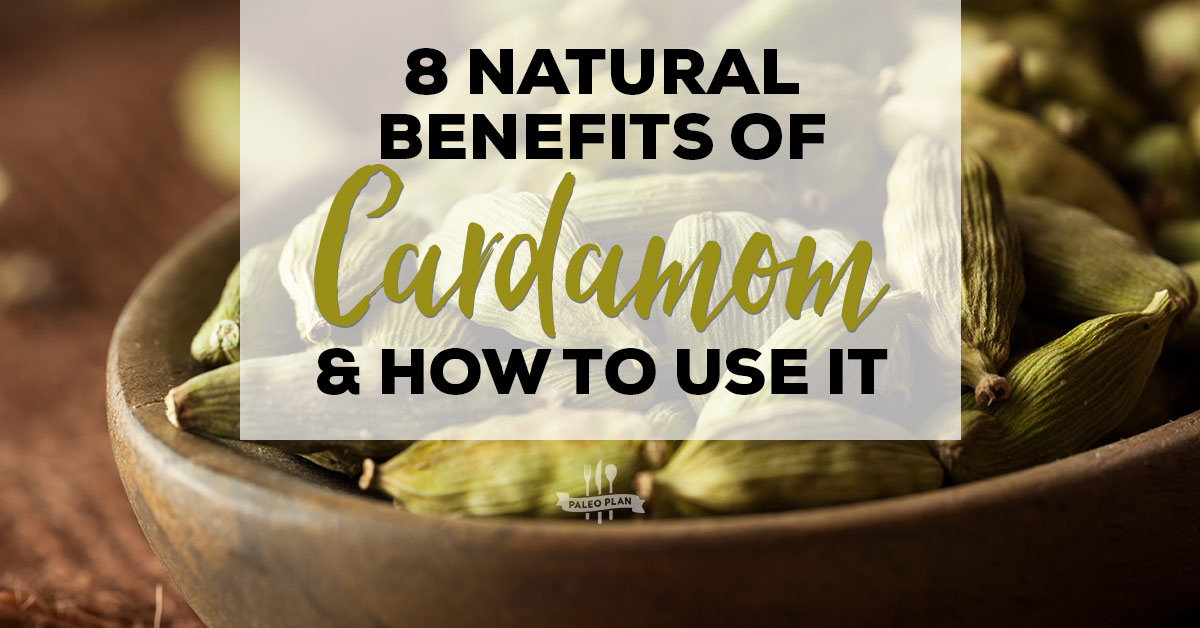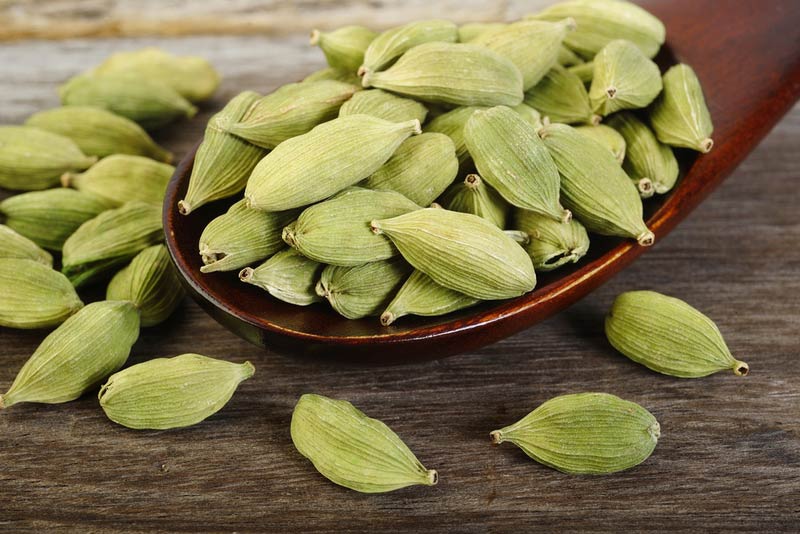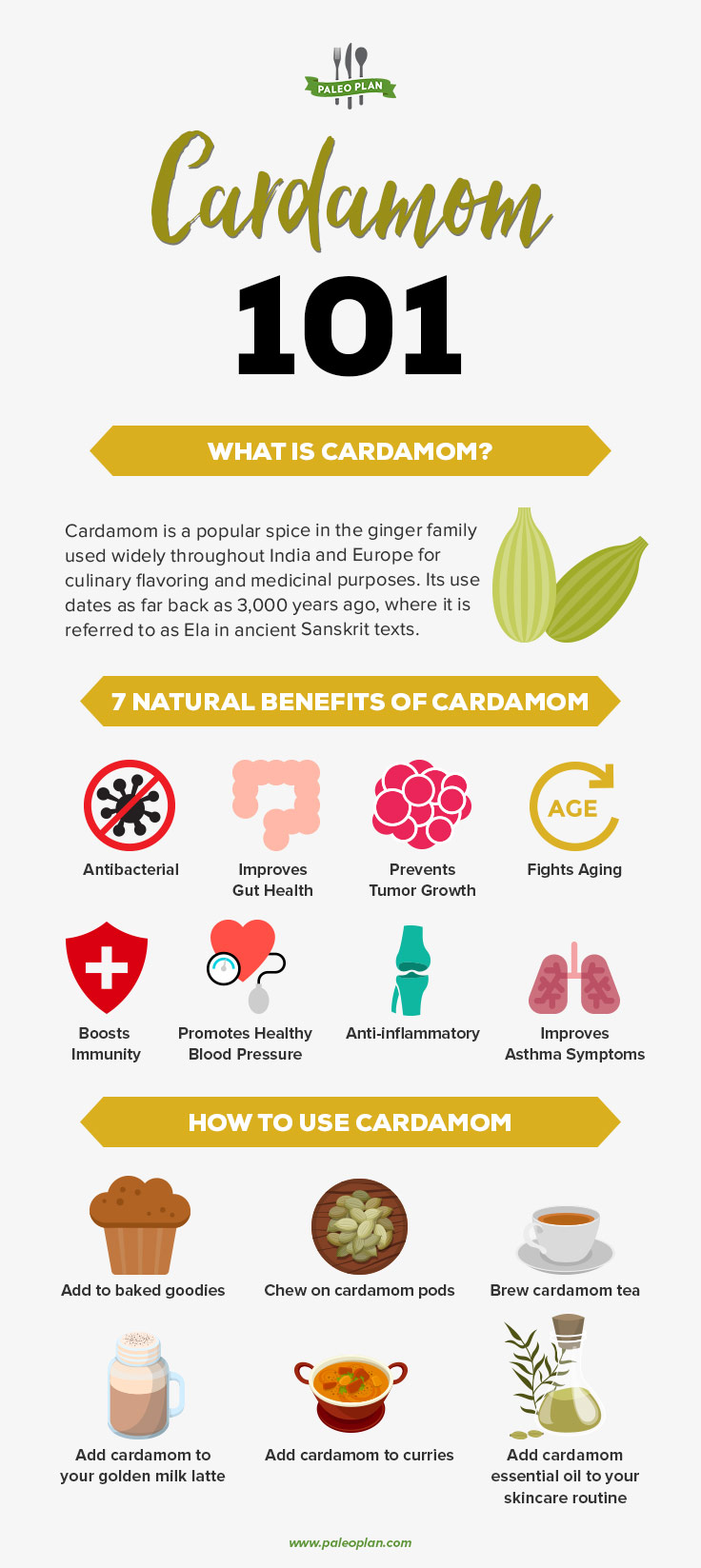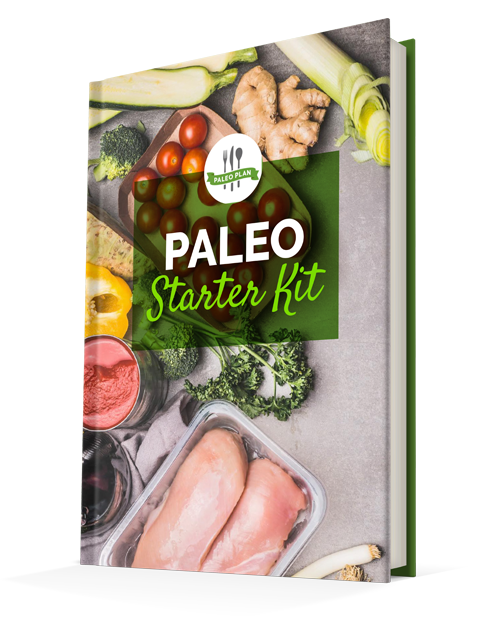
When it comes to super-spices, cardamom comes out as a top contender. Don’t be afraid to branch out and add it to your diet – its benefits match (and even rival) those of turmeric.
What Is Cardamom?
Cardamom is a popular spice in the ginger family, used widely throughout India and Europe for culinary flavoring and medicinal purposes. Its use dates as far back as 3,000 years ago, where it is referred to as Ela in ancient Sanskrit texts.
While cardamom is just now starting to re-emerge as a super-spice, it was well-known throughout the ancient world not only for its flavor, but also its benefits. It has been said that the king of Babylon grew cardamom in his herb garden, and it remained one of the most popular spices in Greek and Roman cuisine. It was so prized, in fact, that it was put under taxation in Alexandria in 176 AD. (1)
From improving digestion and fighting aging to preventing cancer, cardamom is no secondary spice when it comes to improving health. Read on to see why.
8 Natural Benefits of Cardamom
1. It’s Antibacterial
For thousands of years, cardamom has been revered throughout India for its antiseptic properties. The compound cineole found in cardamom has been shown to also be effective against the Staph bacteria, E.coli bacteria, and even candida yeasts when combined with other antimicrobials. (2)
Additional studies show it also helps fight the bacteria that cause tooth decay. (3)
2. Improves Gut Health

Typically, cardamom is overlooked in favor of ginger or peppermint when it comes to easing digestive woes. However, cardamom has proven itself to be worth a second look if you’re having gut issues.
Research has shown that cardamom has a protective effect in the gastrointestinal tract, with the ability to reduce ulcer lesions by up to 70 percent. (4) In addition, studies have also shown that the active component in cardamom, cineole, can help control acid levels in the gut, potentially making cardamom excellent for those with acid reflux. (5)
In the ancient tradition of Ayurveda, cardamom is used to relieve cramps, bloating, diarrhea, and other symptoms of an imbalanced gut.
3. Prevents Tumor Growth
Several of the oils found in cardamom are so potent, they’ve even been shown to fight against cancer and tumor growth. The extract eucalyptol in particular demonstrates anti-inflammatory, anti-proliferative, and anti-invasive effects against tumors. (6)
This is true for multiple types of cancers, as other studies have shown that cardamom helps prevent the spreading of skin papillomas in non-melanoma skin cancer cases. Researchers believe this is due to its ability to activate detoxification enzymes like glutathione, which help fight DNA damage that leads to tumor development. (7)
4. Fights Aging

Many of the signs of aging we experience, such as wrinkles, graying hair, loss of skin suppleness, and even a higher risk of developing disease, are caused by molecules called free radicals. These molecules come from sources like environmental pollution, a bad diet, and stress, and can damage our bodies to the point of developing diseases.
Antioxidants, on the other hand, are DNA-protective compounds found in healthy foods and spices that eat up these free radicals before they can do damage. As it turns out, cardamom is full of antioxidants like flavonoids and polyphenols, as well as E. repens hexane extract, which have been shown to reduce inflammation and fight free radical damage. (8)
5. Boosts Immunity
Cardamom has been shown to boost your natural production of killer T cells. These immune cells are responsible for tackling foreign invaders in your body, which includes cancer. One study found that combining cardamom with black pepper significantly increased T cells’ ability to kill cancer cells. (9)
6. Promotes Healthy Blood Pressure

Research has shown that cardamom can also help lower your blood pressure. One study out of India found that giving 20 stage 1 hypertension patients three grams of cardamom powder daily in two divided doses for 12 weeks resulted in decreased systolic, diastolic and mean blood pressure.
Not to mention, the cardamom was also able to increase their total antioxidant levels by a whopping 90 percent in just three months. (10)
7. It’s Anti-inflammatory
Cardamom is similar to turmeric in that they both share potent anti-inflammatory properties. One study found that, compared to a placebo, cardamom was able to significantly decrease markers of inflammation and oxidative stress in pre-diabetics. (11)
In addition, cardamom has also been shown to fight inflammation by activating the antioxidant glutathione, which helps fight free radicals that may aggravate chronic inflammation. (12)
8. Improves Asthma Symptoms

One study showed that cardamom acts as a bronchodilator, helping to open up the lungs and airways and increase air flow. Of course, these are huge factors when it comes to making breathing easier in asthmatics. (13)
How to Use Cardamom
Cardamom’s sweet, slightly nutty-with-a-bite flavor makes it extremely versatile and great for adding to recipes. Keep reading to see how you can easily get more in your diet.
1. Add to baked goodies

Cardamom makes a great exotic addition to baked goods, especially when added to sweet recipes. Try adding some to your next batch of almond flour cookies, muffins, or even pancakes.
2. Chew on cardamom pods

Cardamom pods were traditionally chewed to extract some of their benefits, so don’t be afraid to munch on some when your stomach is feeling upset or you have a sensitive tooth.
3. Brew cardamom tea

Make your own cardamom tea by combining cardamom pods, cinnamon, vanilla bean, and black tea. Play with the ratio of cardamom; if you like a super-sweet flavor, try using more cinnamon.
4. Add cardamom to your golden milk latte

Cardamom doesn’t have to compete with turmeric – you can get the best of both worlds by adding cardamom to your anti-inflammatory golden milk latte. Just a pinch will do.
5. Add cardamom to curries

Cardamom adds another layer of flavor to curries, and pairs especially well with medium-spiced curry dishes.
6. Add cardamom essential oil to your skincare routine

As we mentioned earlier, cardamom is loaded with antioxidants that help prevent aging and free radical damage. This makes the essential oil a great addition to your skincare routine. Add a drop to your favorite moisturizer (always dilute essential oils with a carrier oil) and apply on your face and body.

